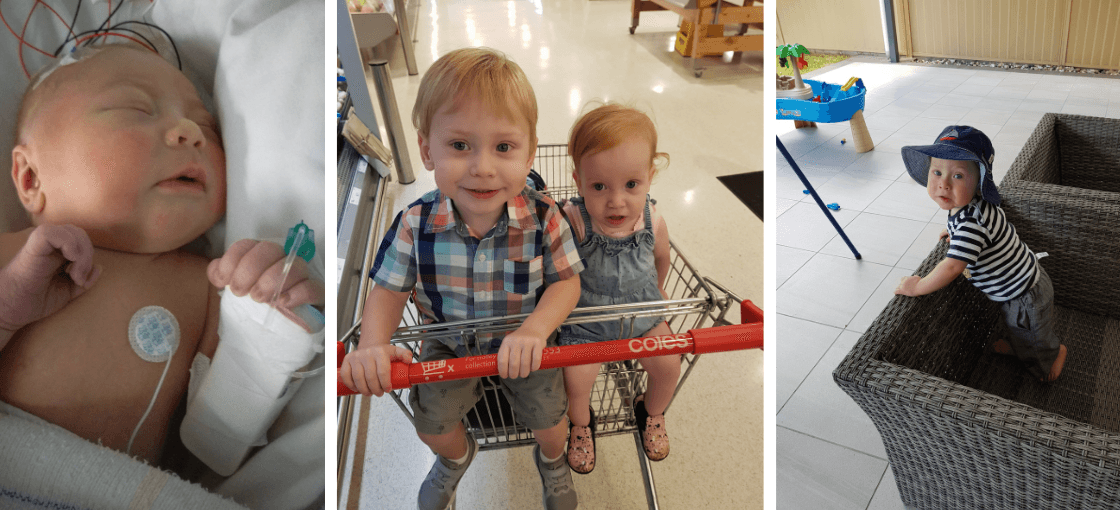You helped David lead a happy, healthy life

In 2017 Sarah was induced two weeks early after having a straight forward pregnancy. The labour was also going as expected up until when David was born and he immediately needed to be resuscitated.
“David was very unwell. It was a shock to everyone in the room as everything was going so well. He was rushed away for medical attention and he had to be ventilated. It was a complete blur for me at that stage. My husband, Sasha, and I were incredibly concerned but we were also reassured that David was in the best hands”.
David was taken to Mater’s Neonatal Critical Care Unit (NCCU) where he remained for a week. It was there that Professor Helen Liley mentioned the PAEAN study.
About the PAEAN study
Neonatal Hypoxic Ischaemic encephalopathy (HIE) is a potentially life-threatening condition. It occurs when a baby does not receive enough blood or oxygen before or during birth. This can destroy vital cells in a newborn baby’s brain.
If a baby survives, the condition can lead to lifelong health problems and disabilities. HIE is extremely difficult to predict and prevent.
The Preventing Adverse Outcomes of Neonatal Encephalopathy with Erythropoietin (PAEAN) study is looking at ways to limit the injury and brain cell death that occurs in babies with HIE. HIE damages a baby’s brain very quickly—but this damage then slowly progresses further. This means there is an opportunity to slow or stop HIE and the cell death it causes in a baby’s brain.
After reading a lot of material and seeking advice, Sarah and Sasha decided to go ahead with the study.
“It seemed to be a great study to be a part of. The positives outweighed the potential negatives so we were happy for David to be a part of the trial which is so important for many babies who receive a lack of oxygen when they are born.”
David, like other babies in a similar situation, received induced cooling treatment (hypothermia) over three days.
“It was a little daunting but David was very ill so he needed as much help as possible.The staff at Mater were truly incredible. Every person we encountered treated us with so much care and respect. It was such a terrible time but they made as at ease as much as possible. Trials like this one are so important for future health of our babies and give parents hope at a time when we need it most”.
The Induced hypothermia that gave David the best chance at a healthy life is used in neonatal intensive care units around the world.
However, more than one third of babies treated with this still live with long-term problems.
David is one of the lucky ones. At David’s six week check up with his Obstetrician, Sarah learned that they didn’t expect David to survive his first night. At six weeks David showed no sign of the physical trauma he had experienced. He truly was a Mater little miracle.
David now
David is now a healthy two-and-a-half year old. He has had no health concerns since leaving Mater and has amazed his parents by reaching all his milestones ahead of time.
“David is active, chatty, happy, social, smart and so caring towards his little sister, Jessica. His passions include garbage trucks and diggers—much like any boy his age! He gives us so much joy.”
Looking back, Sarah recalls David’s birth and time in NCCU as the most intense and traumatic experience of her entire life.
“We truly believe that if David had not been born at Mater and had access to the care and medical research offered there, his outcome would have been very different. The only physical reminder for us is the tiny scar from the cannula that was put into his hand”.
The PAEAN study is trying to improve induced hypothermia treatment for HIE.
The PAEAN study at Mater will combine induced hypothermia therapy with Erythropoietin (EPO), a type of hormone which shows promise as a treatment for HIE when given to babies in their first week of life. The study will examine whether a combination of EPO and induced hypothermia can reduce the numbers of babies suffering from death or disability as a result of HIE.
Preliminary human studies indicate it can not only halt damage to babies’ brains, but also repair and regenerate the damaged cells.
The trial, which will involve 300 high risk babies in Australia, New Zealand and Singapore, is expected to show a reduction in cerebral palsy in the treated group by between 10 and 14 per cent. This equates to preventing cerebral palsy in 20 to 30 Australian babies each year, as well as preventing other serious problems with development and many deaths.
The PAEAN study requires more funding to finish the trial and translate the findings to patient care which ultimately give more babies like David the best chance at a healthy life.
Our latest articles about:
